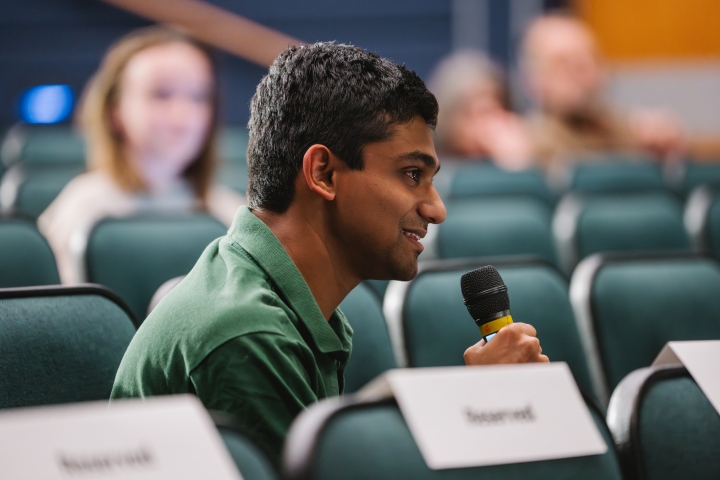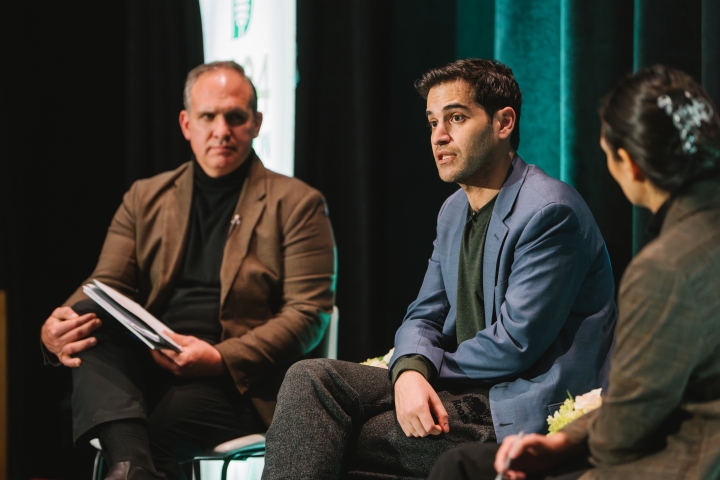Harry Enten ’11, host of CNN’s Margins of Error podcast, said in a Dartmouth talk on Thursday that no one who paid attention to the polls should have been surprised by Donald Trump’s election victory.
The case for Trump winning was pretty simple, the senior political data reporter for CNN said. A week before the election, he noted, only “28 percent of the country thought we were on the right track, going in the right direction. No incumbent party has ever won reelection with a number that low.”
Also there were significant registration gains among Republicans in all the key swing states.
“I think the real shocker was that it was as close as it was,” Enten told a crowd of about 100 people in Loew Auditorium. The event was also watched by more than 50 people via livestream.
Though some states are still counting votes, Trump appears to have won the Electoral College, 312-226, and was carrying just over 50% of the 151.4 million votes tallied nationwide, according to the New York Times on Friday.
The event, moderated by Jason Barabas ’93, director of the Nelson A. Rockefeller Center for Public Policy, and Mia Costa, assistant professor of government, was part of the 2024 Election Speaker Series panel co-sponsored by the Rockefeller Center and Dartmouth Dialogues.
Polling data showed large percentages of people said their number one issue in the election was the economy, and a majority said they trusted Trump more than Democrat Kamala Harris on that issue. People were upset with the state of immigration, and over the past decade immigration has always been a top issue for Trump, Enten said.

The story of the 2016 election was that Trump did historically well with white voters without a college degree. The story of the 2024 election will be that Donald Trump made key inroads among voters of color without a college degree, Enten said.
“Pre-election polling made a very, very heavy statement that Donald Trump was going to do well among voters of color—African-Americans and Hispanics, Asians—and the exit polls seem to confirm that,” Enten said.
And the expectation among many Democrats that the message of Trump as anti-immigrant, brought into high relief after a comedian’s disparaging remarks about Puerto Rico during a Trump rally at Madison Square Garden, neglected to understand an important subtlety.
“In reality, I think that a lot of voters of color and Hispanic voters heard that he’s anti-illegal immigration,” Enten said. “And they made a distinction that I think a lot of folks in the media missed. I think it was rather naive, even silly to think that if Trump is making a play on being anti-Illegal immigration, that people who work in the country legally and are citizens would not make the same distinction.”
When polling puts the candidates within a few percentage points, or even a tie, across the country, all it takes is a broad-based trend, like the shift to Republicans by some voters of color, to decide the election. And the trend toward Trump was remarkably consistent across the country, in cities like Chicago, New York, and San Francisco, in rural areas, and in the suburbs, Enten said.
“In California, where Donald Trump at this hour is losing by 20 points—something like that—that’s still a 10-point improvement over 2020.”
Considering these factors and the international trend to vote against incumbent parties, another surprise from 2024 is how close Democrats were to holding the House of Representatives and the number of cases of ticket splitting, with voters choosing Trump and at the same time favoring Democratic candidates for Congress.
“Trump had some coattails, but they really weren’t that long,” Enten said.
If the Republicans end up with 221 seats in the House, as the trends seem to suggest, “that is the fewest seats that the majority party has won in a House election since there were 50 states in the union. That’s how close this election was,” Enten said.
But the results, Enten said, leave the Democrats in a dark place.
“Right now Democrats don’t hold any levers of power, and there is no leader of the Democratic Party,” he said. “But there is a massive difference between that and saying that things won’t improve. We have a midterm election in two years, and based on history, the Democrats are very likely to gain control of the House of Representatives.”
And, Enten said, what he called “extreme” Cabinet picks such as former U.S. Rep. Matt Gaetz for attorney general and Robert F. Kennedy Jr. for health and human services secretary could divide the Republican Party and dissipate Trump’s claims of a clear mandate.
“Mandates have a funny way of slipping away. And I do wonder whether or not Trump recognizes that the more he puts forward these nomination choices, what he does is, one, rally the Democrats, and, two, divide his own party,” Enten says.
Zach Rosca-Halmagean ’28 called the panel with Enten “awesome.”
“I see him on CNN and he had the same energy here. It was really cool to see someone who is part of the Dartmouth community so invested in their work and know it so well,” Rosca-Halmagean said.
Dartmouth’s 2024 Election Speaker Series continues on Feb. 20 with attorney, educator, and women’s rights advocate Anita Hill.

